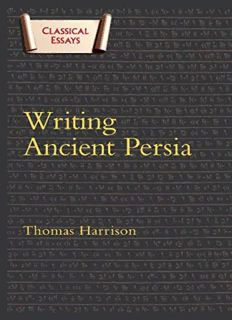
Writing Ancient Persia PDF
Preview Writing Ancient Persia
Writing Ancient Persia CLASSICAL ESSAYS Series editor: Thomas Harrison, University of Liverpool Ancient Democracy and Modern Ideology P.J. Rhodes Interpreting Classical Texts Malcolm Heath The Invention of Ancient Slavery? Niall McKeown Reading Cicero: Genre and Performance in Late Republican Rome Catherine Steel Writing Ancient Persia Thomas Harrison CLASSICAL ESSAYS Writing Ancient Persia Thomas Harrison Bristol Classical Press First published in 2011 by Bristol Classical Press an imprint of Bloomsbury Academic Bloomsbury Publishing Plc 36 Soho Square, London W1D 3QY, UK & 175 Fifth Avenue, New York, NY 10010, USA Copyright © 2011 by Thomas Harrison All rights reserved. No part of this publication may be reproduced, stored in a retrieval system, or transmitted, in any form or by any means, electronic, mechanical, photocopying, recording or otherwise, without the prior permission of the publisher. CIP records for this book are available from the British Library and the Library of Congress ISBN 978 0 7156 3917 7 Picture credit: all the photographs reproduced in this book are by the author. Printed and bound in Great Britain by CPI Antony Rowe, Chippenham and Eastbourne www.bloomsburyacademic.com For Cyrus, Alexander, Alfred and Flora The real fact is, young Europe is whipped and schooled into admiration of Greece, till no one dares give a candid opinion. Otherwise, how can men in their senses affect to believe all that stuff about the invasion of Xerxes? Edward Eastwick (1864: 26-7) 6 Acknowledgements This is an essay about the writing of the history of the Achae- menid Persian empire. It is not itself a history of Achaemenid Persia (let alone of other periods of ancient Persian history), or even a prelude to the writing of one, but a discussion of the way in which such histories have been, are being, and might be, written. Achaemenid history is now a vast scholarly field – one in which, by rights, as Heleen Sancisi Weerdenburg once put it, ‘one should be thoroughly acquainted with at least six ancient languages’ and their associated scholarly literatures (1990: 253). I might as well state clearly now: I do not pretend to this ideal. What follows is the account of a Greek historian. This is not as perverse as it might seem, given the centrality of Greek sources for Persian history. Indeed, much as one can only be awed by the splendour, scale and variety of so much past and current Achaemenid scholarship, it is an underlying principle of this book that Hellenists can and must engage with this body of work. This essay also makes no pretence of being exhaustive in its coverage. In particular, it focuses on the early period of Achaemenid history in which Persian sources are more plentiful and Herodotus’ Histories constitute the main Greek body of evidence. Certain themes, regions, classes of evidence, and indeed modern scholarship, central to a full 7 Writing Ancient Persia historiography of the Achaemenid Persian world receive little or no attention: the reader will look largely in vain for discussion of Persian religion, for example (apart from the theme of ‘religious tolerance’), for the details of Persian satra- pal administration, or for the modern Iranian reception of Achaemenid history. I hope that these and other exclusions are, at least in part, defensible in terms of my focus on the overall shape and tendency of recent narratives; I have little doubt, however, that they are also driven by the limits of my expertise. In daring to undertake a critique of a scholarly field in which I have only a toehold, I have also necessarily relied upon the generosity and expertise of others. Tom Holland, Lloyd Llewellyn-Jones, Kostas Vlassopoulos, and, not least, my Liv- erpool colleague Christopher Tuplin have all read and commented on a full draft – and, though they cannot be held responsible for the remaining errors and eccentricities, have both helped me to refine my thinking and saved me from embarrassment. The ideas expressed here have been tested both by audiences of scholars (not least through the Mediter- ranean and Near Eastern Studies programme of Trinity College Dublin) and by generations of excellent students at St Andrews and at Liverpool. The experience of working with Deborah Blake and her colleagues at Duckworth has, as al- ways, been a delight. My research has been assisted enormously by the award by the Leverhulme Trust of a Philip Leverhulme Prize. And the support of Catherine Pickstock, in what was otherwise a difficult period, was essential to my completing this essay (and to much else). I should like to express my heartfelt gratitude to all of these, and – not least – to the individual historians of Persia who feature so promi- 8 Acknowledgements nently in this volume, not only for the scholarship to which I am responding, but in the case of Amélie Kuhrt for her encouragement and kindness during a period I spent as a British Academy postdoctoral fellow in her department. Finally, Frances Harrison, Kasra and Cyrus Naji looked after and fed me royally during a trip to Iran in 2007. It is to Cyrus, and to his cousins, that this book is dedicated. A note to the reader In order to make the book accessible to more than the initi- ated, I have in general avoided all abbreviations, e.g. of the names of ancient authors, or of journals. Persian royal inscrip- tions are cited by the standard abbreviations used in e.g. Kent 1953 or Lecoq 1997. Fragmentary Greek historians are cited according to the system of Jacoby’s Die Fragmente der griechis- chen Historiker (now progressively being re-edited and trans- lated as part of a project known as Brill’s New Jacoby), according to which, for example, 688 F 1 denotes Ctesias fr. 1. Kuhrt 1997 is a readily available source of the most impor- tant texts, with excellent notes. The site of Darius’ inscribed account of his accession I have spelled consistently as Behis- tun; this is the same place as Bisitun. 9
Description: